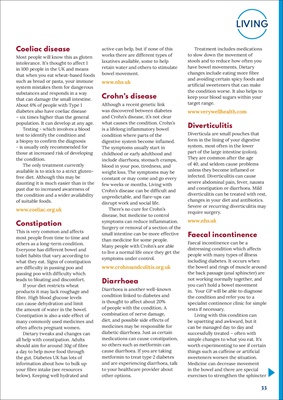
33
LIVING
Coeliac disease
Most people will know this as gluten
intolerance. It's thought to affect 1
in 100 people in the UK and means
that when you eat wheat-based foods
such as bread or pasta, your immune
system mistakes them for dangerous
substances and responds in a way
that can damage the small intestine.
About 6% of people with Type 1
diabetes also have coeliac disease
- six times higher than the general
population. It can develop at any age.
Testing - which involves a blood
test to identify the condition and
a biopsy to confirm the diagnosis
- is usually only recommended for
those at increased risk of developing
the condition.
The only treatment currently
available is to stick to a strict glutenfree
diet. Although this may be
daunting it is much easier than in the
past due to increased awareness of
the condition and a wider availability
of suitable foods.
www.coeliac.org.uk
Constipation
This is very common and affects
most people from time to time and
others as a long-term condition.
Everyone has different bowel and
toilet habits that vary according to
what they eat. Signs of constipation
are difficulty in passing poo and
passing poo with difficulty which
leads to bloating and discomfort.
If your diet restricts wheat
products it may lack roughage and
fibre. High blood glucose levels
can cause dehydration and limit
the amount of water in the bowel.
Constipation is also a side effect of
many commonly used medicines and
often affects pregnant women.
Dietary tweaks and changes can
all help with constipation. Adults
should aim for around 30g of fibre
a day to help move food through
the gut. Diabetes UK has lots of
information about how to bulk up
your fibre intake (see resources
below). Keeping well hydrated and
active can help, but if none of this
works there are different types of
laxatives available, some to help
retain water and others to stimulate
bowel movement.
www.nhs.uk
Crohn's disease
Although a recent genetic link
was discovered between diabetes
and Crohn's disease, it's not clear
what causes the condition. Crohn's
is a lifelong inflammatory bowel
condition where parts of the
digestive system become inflamed.
The symptoms usually start in
childhood or early adulthood and
include diarrhoea, stomach cramps,
blood in your poo, tiredness, and
weight loss. The symptoms may be
constant or may come and go every
few weeks or months. Living with
Crohn's disease can be difficult and
unpredictable, and flare-ups can
disrupt work and social life.
There's no cure for Crohn's
disease, but medicine to control
symptoms can reduce inflammation.
Surgery or removal of a section of the
small intestine can be more effective
than medicine for some people.
Many people with Crohn's are able
to live a normal life once they get the
symptoms under control.
www.crohnsandcolitis.org.uk
Diarrhoea
Diarrhoea is another well-known
condition linked to diabetes and
is thought to affect about 20%
of people with the condition. A
combination of nerve damage,
diet, and possible side effects of
medicines may be responsible for
diabetic diarrhoea. Just as certain
medications can cause constipation,
so others such as metformin can
cause diarrhoea. If you are taking
metformin to treat type 2 diabetes
and are experiencing diarrhoea, talk
to your healthcare provider about
other options.
Treatment includes medications
to slow down the movement of
stools and to reduce how often you
have bowel movements. Dietary
changes include eating more fibre
and avoiding certain spicy foods and
artificial sweeteners that can make
the condition worse. It also helps to
keep your blood sugars within your
target range.
www.verywellhealth.com
Diverticulitis
Diverticula are small pouches that
form in the lining of your digestive
system, most often in the lower
part of the large intestine (colon).
They are common after the age
of 40, and seldom cause problems
unless they become inflamed or
infected. Diverticulitis can cause
severe abdominal pain, fever, nausea
and constipation or diarrhoea. Mild
diverticulitis can be treated with rest,
changes in your diet and antibiotics.
Severe or recurring diverticulitis may
require surgery.
www.nhs.uk
Faecal incontinence
Faecal incontinence can be a
distressing condition which affects
people with many types of illness
including diabetes. It occurs when
the bowel and rings of muscle around
the back passage (anal sphincter) are
not working normally together, and
you can't hold a bowel movement
in. Your GP will be able to diagnose
the condition and refer you to a
specialist continence clinic for simple
tests if necessary.
Living with this condition can
be upsetting and awkward, but it
can be managed day to day and
successfully treated - often with
simple changes to what you eat. It's
worth experimenting to see if certain
things such as caffeine or artificial
sweeteners worsen the situation.
Medicine can decrease movement
in the bowel and there are special
exercises to strengthen the sphincter